The Unified Patent Court (UPC) is revolutionizing the way patents are enforced in Europe, and McDermott's intellectual property team is here to help you navigate this dynamic landscape. Our Legal Lens on the Unified Patent Court newsletter is designed to keep patent holders and legal departments well-informed. And with an on-the-ground team in Germany, France, the United Kingdom and the United States, we offer a unique cross-border perspective.
NOTABLE CASE & POTENTIAL IMPACT
REGENERON PHARMACEUTICALS, INC. V. AMGEN INC.
Topics: inventive step; obviousness; genus claims in the life sciences sector
On July 16, 2024, the UPC issued its first-ever revocation judgment, invalidating a key patent owned by Amgen Inc. Back in June 2023, Amgen filed an infringement action against Regeneron Pharmaceuticals, Inc. and its partner company, Sanofi, in the Local Division Munich. Regeneron counterclaimed for revocation of the patent in the infringement action and the Sanofi parties brought a separate revocation action against the patent in the Central Division Munich. Thereafter, Regeneron's counterclaim was referred to the Central Division and combined with the revocation action.
The Amgen patent at issue relates to a monoclonal antibody or fragment that binds to and blocks a protein (PCSK9) to lower low-density lipoprotein cholesterol. The Central Division Munich invalidated the patent because it lacked an inventive step over a prior art reference by Lagace et al. that directed researchers to develop antibodies that target PCSK9. The Court reasoned that it would have been "the next obvious step" from the Lagace reference for researchers to develop antibodies against PCSK9 and doing so "would not amount to more than routine experimentation for the skilled person."
This latter assertion that making PCSK9 antibodies requires only routine experimentation marks an important point of disagreement between the UPC and the Supreme Court of the United States, which in 2023 invalidated two related Amgen patents directed at PCSK9 antibodies for lack of enablement. In the 2023 decision, the Supreme Court said that Amgen's patents would require a skilled person to engage in not routine but "painstaking" experimentation amounting to a "hunting license" and a "research assignment."
TAKEAWAYS:
- The Amgen patents at issue claimed a genus of antibodies. European and US courts invalidated related patents but for entirely different reasons: While US courts found the patent claims invalid because the full scope of the genus is not enabled, the UPC held that a skilled person would have known how to proceed based on the prior art alone because methods for finding antibodies were well known in the art.
- The UPC's decision in this case potentially shows that US courts and the UPC have different standards for enablement and inventive step that may collide across the Atlantic.
EMERGING LEGAL ISSUE
DexCom, Inc. v. Abbott is the latest in a series of protracted patent litigations between the two parties over their competing continuous glucose monitoring (CGM) technologies that has – until recently – largely taken place in the US. The parties settled earlier litigation in 2014 with a license agreement. However, after several litigation-free years, the parties' conflict was reignited when DexCom sued Abbott in the US in June 2021, again accusing Abbott of patent infringement for its FreeStyle Libre 2 device. This sparked a flurry of litigation between the parties in the US. Since 2021, Abbott and DexCom have been involved in four district court cases and 26 inter partes review (IPR) proceedings concerning roughly 40 patents directed to CGM technology.
Two of the district court cases went to trial in mid-2023 and early 2024, resulting in verdicts that found Abbott had a license to certain claims of a DexCom patent and DexCom was liable for infringing one of several asserted Abbott patents.
In parallel with the US suits filed since 2021, litigation began in Europe when DexCom asserted a CGM patent (EP 3 435 866) in the UK, at the UPC, and in Germany. Thus far, DexCom's assertions have been unsuccessful in the UK and before the UPC. (The German suit is still pending.) The UK High Court of Justice rendered a consent order revoking the patent's UK designation. The UPC declared the same patent invalid in July 2024.
DexCom's attack in the UPC asserted the EP '866, which Abbott was not initially able to invalidate through European Patent Office (EPO) opposition proceedings in 2023. The EP '866 and its respective national counterparts have been part of many validity challenges and survived, suggesting that the patent was valid.
DexCom's action seemingly intended to capitalize on that view. But by initiating a lawsuit at the UPC, DexCom risked Abbott filing a (ultimately successful) counterclaim for revocation. Pursuant to Articles 32 and 65 of the Agreement on a Unified Patent Court, the UPC allows for counterclaims for revocation, a jurisdictional and procedural option common in US district court patent litigation and in classical patent litigation in continental Europe. But the UPC's approach of permitting both infringement and validity to be handled in the same proceeding contrasts with patent litigation in some European countries. For example, due to the jurisdictional divisions of German courts, a revocation action in Germany is a separate action rather than a counterclaim in the infringement case.
When the UPC first launched, it provided a fast track for DexCom and Abbott's dispute. A comparison between the timelines of the parties' various proceedings shows that the UPC brings (at least) two benefits: speed and efficiency. Abbott's counterclaim for revocation reached a decision in just eight months, resulting in the UPC entirely revoking the EP '866 with immediate effect across all contracting EU Member States. In contrast, the parties' US district court cases took at least two to three years to resolve, the EPO opposition took a year and a half to resolve, the revocation action before the German Federal Patent Court is still pending (these usually take around two years), and many of the IPR proceedings in the US are still pending (these usually take at least 18 months). As a result, many of the parties' proceedings outside of the UPC that started in 2021 remain pending today.
Apart from its efficiency, the UPC's approach to substantive legal issues may benefit certain litigants. While the UPC (in the revocation action) agreed with the EPO (in the earlier opposition proceeding) that the EP '866 was novel over the prior art submitted by Abbott, the UPC departed from the EPO in finding that the patent lacked an inventive step. The UPC revocation attack line thus provided Abbott an additional avenue that was not available after its earlier setbacks before national courts.
One way the UPC may provide that additional avenue arises from its evolving approach to patentability and, in particular, inventive step. The EPO typically follows a problem-solution approach for inventive step that looks at the closest or most promising prior art to the challenged patent claim. In this case, the UPC considered statements already made about the EP '866 (by the German Federal Patent Court and the EPO) and the closest prior art, similar to the EPO's problem-solution approach. However, the UPC did not follow that approach exactly. Rather, in applying UPC Court of Appeal case law, the UPC placed less importance on the closest prior art concept over an approach that relies on a skilled person's capability, as reflected in the prior art. Indeed, other UPC courts, such as the Central Division Munich, have stated that the concept of "closest prior art" is less important or will be applied less rigidly – without the need to identify the closest prior art as a starting point. Regarding the EP '866, the UPC found it was obvious to use the claimed data transmission protocol in light of the closest prior art, common general knowledge in the art, and a lack of a particularized disclosure about the feature in the EP '866.
Further, the treatment of UPC decisions by other European courts will likely provide key benefits for litigants involved in cross-jurisdictional disputes. For DexCom and Abbott, it is unclear whether – and to what extent – the German Federal Patent Court will follow the UPC's latest decisions. What is clear, however, is that the UPC will have a significant influence on national jurisprudence and global patent disputes since it will render decisions quicker than national courts and because many part-time UPC judges continue to work part-time in their existing national court. And while the UPC will certainly see standalone cases (e.g., Kaldewei v. Bette), parties may increasingly view the UPC as an integral part of a global intellectual property strategy involving lawsuits in multiple jurisdictions, including US and European courts.
Ultimately, the swift and decisive outcome at the UPC has significantly altered the landscape of the legal battle between DexCom and Abbott.
RECENT FILINGS
This section reflects updated data regarding UPC usage, taken from the UPC's register as of August 19, 2024.
NUMBER OF CASES ON UPC REGISTER BY TYPE
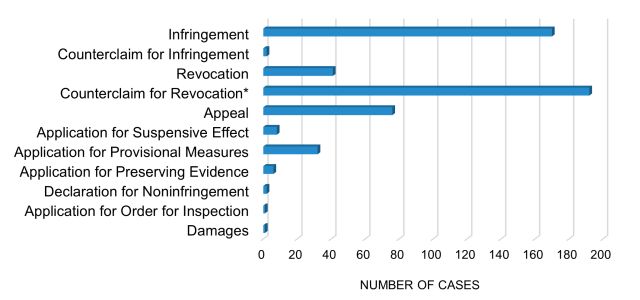
*The number of counterclaims for revocation cases does not necessarily reflect the UPC's true case load because the UPC's Case Management System required several defendants in infringement proceedings to launch their own counterclaim for revocation, even if the substance of the counterclaims was fully identical across the parties. This inflates the number.
NUMBER OF CASES ON UPC REGISTER PER DIVISION
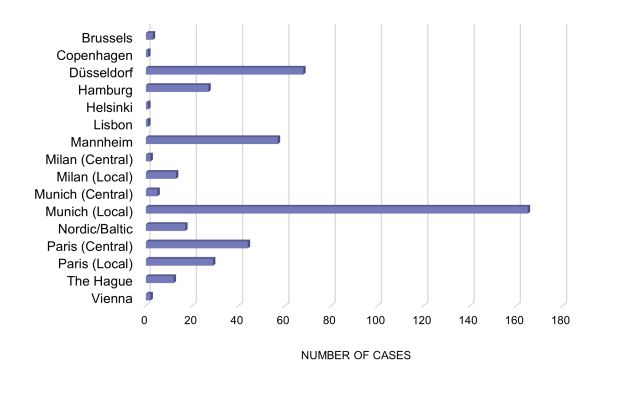
LANGUAGE OF UPC PROCEEDINGS
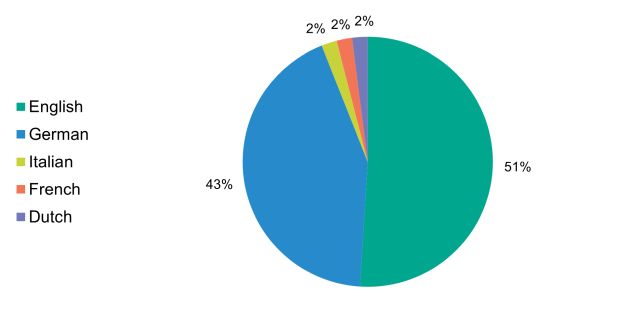
FIRST INSTANCES OF INFRINGEMENT AND REVOCATION CASES PER MONTH IN 2023 AND 2024
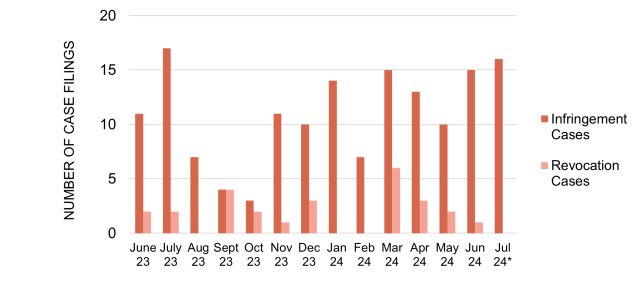
*July 2024 values are potentially incomplete.
INFRINGEMENT AND REVOCATION CASE VALUES
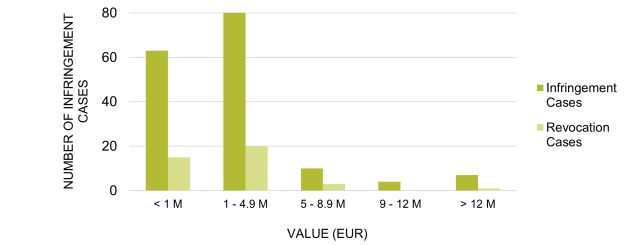
The content of this article is intended to provide a general guide to the subject matter. Specialist advice should be sought about your specific circumstances.








